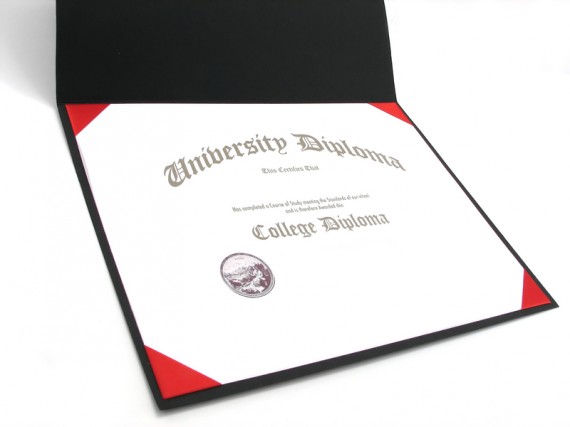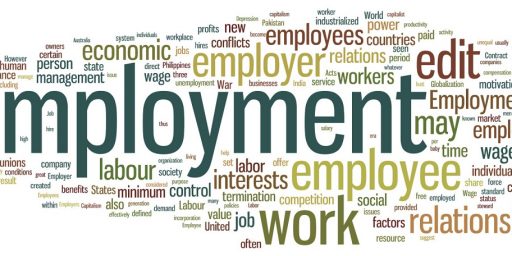The Latest Salvo in the Debate over the Value of Higher Education
A new study indicates that college degrees lead to higher wages even in fields that do not require a degree.
 Writing in the NYT‘s Sunday Review, David Leonhardt notes Even for Cashiers, College Pays Off.
Writing in the NYT‘s Sunday Review, David Leonhardt notes Even for Cashiers, College Pays Off.
The basic setup in the column is along the lines of numerous pieces on this subject, to wit: is college worth the cost?
The interesting take-away is that following:
The evidence is overwhelming that college is a better investment for most graduates than in the past. A new study even shows that a bachelor’s degree pays off for jobs that don’t require one: secretaries, plumbers and cashiers. And, beyond money, education seems to make people happier and healthier.
[…]
The Hamilton Project, a research group in Washington, has just finished a comparison of college with other investments. It found that college tuition in recent decades has delivered an inflation-adjusted annual return of more than 15 percent. For stocks, the historical return is 7 percent. For real estate, it’s less than 1 percent.
Another study being released this weekend — by Anthony Carnevale and Stephen J. Rose of Georgetown — breaks down the college premium by occupations and shows that college has big benefits even in many fields where a degree is not crucial.
Construction workers, police officers, plumbers, retail salespeople and secretaries, among others, make significantly more with a degree than without one. Why? Education helps people do higher-skilled work, get jobs with better-paying companies or open their own businesses.
This follows the pattern of the early 20th century, when blue- and white-collar workers alike benefited from having a high-school diploma.
The following graphic from the piece illustrates this point rather strikingly:

Some make intuitive sense (i.e., teacher assistant), while others (dishwasher) are rather stunning.
And the basic conclusion:
“Sending more young Americans to college is not a panacea,” says David Autor, an M.I.T. economist who studies the labor market. “Not sending them to college would be a disaster.”
And I can’t disagree with the following (and something that has occurred to me in the past):
Then there are the skeptics themselves, the professors, journalists and others who say college is overrated. They, of course, have degrees and often spend tens of thousands of dollars sending their children to expensive colleges.
I don’t doubt that the skeptics are well meaning. But, in the end, their case against college is an elitist one — for me and not for thee. And that’s rarely good advice.
Indeed.






I think the key is to make sure that people who are going to college are actually spending their money well. For the vast majority of people, college is a huge financial investment up front for a long term payoff, which can be a great investment – if you know how to plan for those kinds of things. I would posit that there are a lot of people in college who aren’t good at evaluating those kinds of financial numbers and the crushing economy is illustrating that to many people. I know several people who went to law school (with the requisite debt associated with such pursuits) because they thought it was the quickest way to a six-figure salary and ended up crushed by an oversupplied industry hidden by misleading marketing figures. One former roommate of mine had over $150,000 of student loan debt and still hadn’t finished a bachelor’s degree at the time, but at least was in a hybrid engineering/management program which would pay decently (though his long term plan didn’t take that into account – he was just going to try and wait out defaulting in hopes of getting some inheritance).
When you see stories of people who spend $120,000 on a theater degree from a private university because no one has explained to them the costs of long term debt versus future earnings and are now buried under non-dischargeable debt for the rest of their lives, the point that we should be teaching is that people (and the system in which they are spending their money) need to do a better job of encouraging people to spend on something that provides a cost-effective value for what they’d like to do instead of encouraging pipe dreams that are profitable for an organization or two at the extreme detriment of a single party. Easier said than done, though.
Could you possibly link the graphic to the full size original? The shrunken version in the post is too small to read.
@SD:
Just click through to the NYT link at the start of the post and the graphic is on the left.
@Kit,
Well said. I’m still trying to wrap my head around a $34K a year dishwasher. I have to wonder how local come to effect those salaries — might a college educated person be more likely to work in an higher paying area (which might also signal a higher cost of living).
Beyond that, I would love to see these adjusted for educational debt load.
For example, going with the “average” cheapest form of a 4 year degree available to a student in NY, being a commuter at a SUNY college, the student is currently looking at approximately $14K a year (source). Barring tuition increases and assuming that the average student has at least half of that financed through loans, that means graduating with $28K in debt (this is largely inline with current debt estimates).
That, projected over a lifetime of paying it back, seems like it would change the economics of these calculations.
While I’m a proponent of higher education, I’m always bemused by these univariate analyses and the assumption of causation derived from them. While it’s quite plausible that college imparts skills that are useful even in menial jobs, it’s at least as likely that the type of person who goes to college and completes their degree is simply more possessed of the raw skills (intellect, gumption, willpower, ability to adhere to schedules and follow instructions, and so forth) that are rewarded in the economy.
I have to agree with mattb. What you’re leaving out of the equation is the massive debt load that one has to pay off. Many people who go to college end up coming out with debt up to eyeballs, around $50,000 usually. I was lucky in that I got a scholarship and went in-state to SUNY, but not everyone has that opportunity.
So, in the end, you have to balance that $34,000 against about twice that in debt, if not more, while the guy making only $19,000 doesn’t have to pay all that off. Thus, one could probably say the guy without the college degree is wealthier–at least he doesn’t have so much debt tying him down.
And I would like to question where a a dishwasher could get paid $34,000 a year. Is that really the average? That sounds kind of high.
What Dr. Joyner said. There are three factors at play: the value-added by going to college, where going to college puts you in the job queue, and the type of people that go to college and those that don’t. The second factor is such that someone with a degree that buses tables is likely to get a job at a much, much nicer restaurant. Not because a degree in English lit helps you bus tables better, but because those doing the hiring have to make their decision on some basis and feels more confident that someone with a college degree will act more professionally than somebody on the street. Signalling and all that. The third factor is pretty straightforward: those with the upbringing, discipline, and smarts/talent to get through college might do just as well if they never went (if given the chance).
All of this to say is that going to college is a no-brainer when it comes to the individual. But as a signalling mechanism, it’s pretty inefficient. If it is not the first factor, the value-added, that’s driving things, it’s a collective action problem. People go to college to have better signals than those that don’t. Then, if everyone goes to college, you’ll have to start going to grad school, or you will have to go to a better college. And so the line doesn’t change. It’s just that everybody is spending more money and time to maintain their place in it.
@Trumwell:
This becomes an real concern when that the income they derive from said “place” doesn’t keep pace with the amount of $’s they are investing to maintain said location.
@Jeremey:
Actually the current national average seems to be hanging around $24k (which seemed a bit low to me). But that’s up some 8% over last year and 47%! from a decade ago (source).
FWIW, if the source article is making a financial case, they can’t do it by showing “more.”
The key concept, from a financial perspective is ROI, and after that, opportunity cost.
(The opportunity costs might be in the cheaper or alternate degree you might have earned, or trade school, or military service, etc.)
… which all tallies with other comments above.
No, the problem is more complicated. The problem is that you have too much people studying things like Liberal Arts and Law(Mostly because they have poor Math) and most of these people have poor reading.
There is little that you can do with people that studies Liberal Arts and do not read. 😉